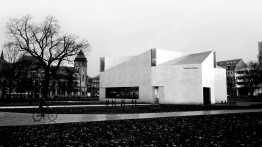JA Architecture Studio named an Emerging Voice by The League
POSTED ON: March 10, 2022

Bauhaus Museum Dessau, 2014. Dessau, Germany. 4th Prize, Bauhaus Museum Competition.
JA Architecture Studio—founded by Iranian-Canadian architects Nima Javidi and Behnaz Assadi—has been selected by The Architectural League of New York for its 2022 Emerging Voices competition and lecture series. Javidi is currently The Cooper Union’s Gwathmey Professor in Architecture; Assadi is an assistant professor at the University of Toronto Faculty of Architecture, Landscape, and Design.

Being named an Emerging Voice by The Architectural League is one of the most coveted awards in North American architecture. Since 1982, the program has identified more than 300 awardees who have since developed influential careers. Paul Lewis, an Emerging Voices jury member and president of The Architectural League, describes the 2022 winners, noting:
“In our initial review of the applications for this year’s Emerging Voices, the jury was struck by the breadth of the different types of work. But, rather than indicating a fracturing of our discipline, this year’s winners were united in how they each clarified new types of agency, and new notions of value motivated by an optimism about what an architect could and should do.”
JA Architecture Studio is a Toronto-based practice that emphasizes light wood frame construction, geometric experimentation, and vernacular form. From the narrow plots of Toronto’s Queen West neighborhood to large-scale international design competitions, the Studio employs a “one-to-one” process, defined by Assadi and Javidi as a design approach shaped by “the physical register of immigration, of being slightly off from the context that you aspire to fit within, struggle with, and eventually change.”
Through conversations that range from the role of public art with curators to the wood joinery of a three-legged chair with a local furniture maker, the Studio investigates the core of architecture by operating at numerous points around its periphery, connecting Studio themes and interests to those of the world at large. This approach was not chosen for its assurance of success, but as a way of investigating the merit and relevance of the Studio’s ideas across as wide a variety of scales and contexts as possible.

JA Architecture Studio has pursued a broad repertoire of built works, research projects, and award-winning competition entries, which together have been published widely and exhibited both nationally and internationally. Studio projects include Bore-ing Lightness, a finalist proposal for the Canadian pavilion at the 2020 Venice Biennale; Wardell, a curved, brick-clad addition to an existing string of row houses in Toronto; and Forno Cultura, a cafe and bakery on the site of a former mechanic’s garage in Toronto. The Studio has also received numerous recognitions from Canadian Architect, as well as two Progressive Architecture Awards from Architect Magazine, the most recent a Merit Award for the studio's project One and a Half.
Javidi and Assadi will present their Emerging Voices lecture on Thursday, March 17, 2022, in Cooper Union's Great Hall. Advance registration with The Architectural League—available here—is required.





